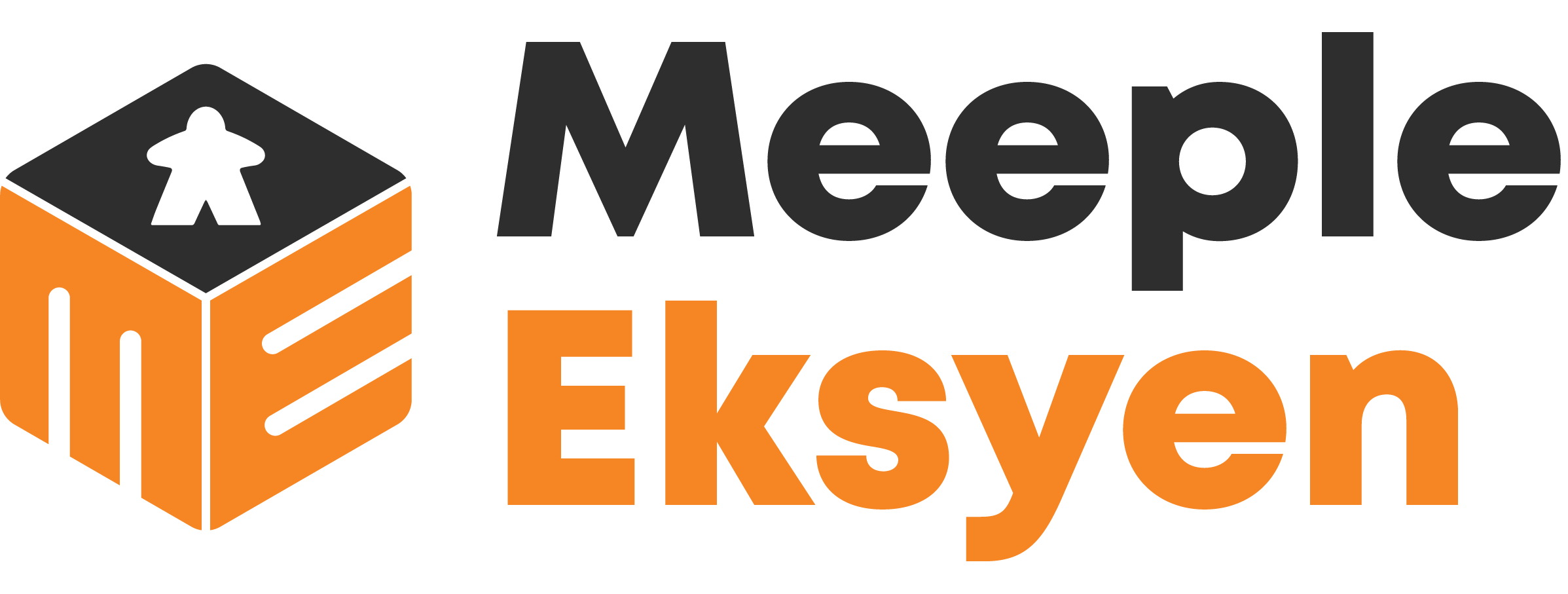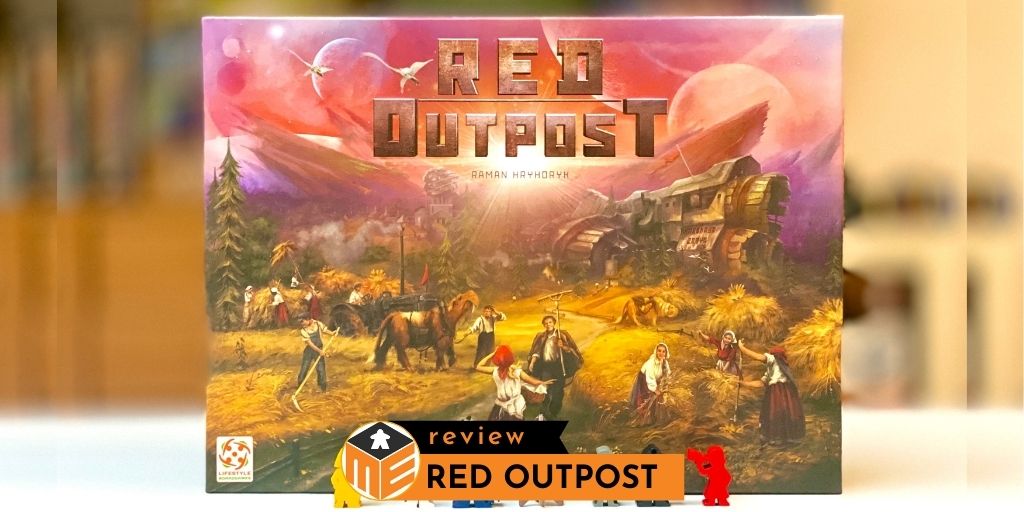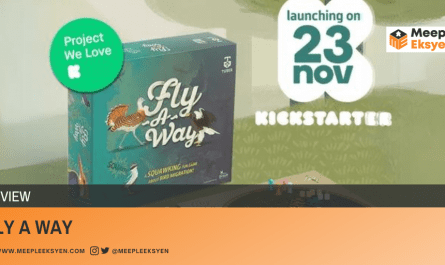The rivalry between the USA and the Soviet was the biggest feud in that grim era. The folks eventually branded this massive event with the infamous label ‘The Cold War’. Although our grandparents saw the conflict ending in 1962, they could still feel the tension remaining afterwards. Both superpower nations continued in the battle to be the first to conquer the space. Apollo 11 was the Americans’ show of power that ended the ruse in 1969…
… Or did the heat really get extinguished like that? What if the commies had secretly (and successfully) launched their spacecraft to another habitable world and started to build their communist utopia? The Red Outpost brings to us this chilling-yet-fictional story to the table.
A short disclaimer before you read my board game analysis
As an avid euro gamer and hardcore Legend of the Five Rings (L5R) LCG player, my reviews may reflect a preference for these styles, and I may not cover solo games/variants extensively. Please note that my personal remarks are based on my gaming experiences, and I aim to provide honest insights within the scope of my preferences.
Coming from the landlocked country of Belarus, Raman Hryhoryk is no stranger to the Сове́тский Сою́з (Sovétsky Soyúz, Soviet Union). An interesting fact I dug from his interview, Red Outpost originally named Дальние рубежи (Dal’niye rubezhi, Distant Frontiers). This game is actually the very first idea he hatched, and it was a complete success in Kickstarter. Collecting a total pledge of US$ 139,136 from shy of 4,000 backers, it is interesting to know how to live in this communist conclave locating in a planet far, far away. For more in-depth rule explanation, I recommend watching the video from GLHF Board Games.
FIRST IMPRESSION ON RED OUTPOST
Let’s start with a bit of rambling from my side. I come from a country with a long history of despising communism. Long story short, I was taught that this ideology was a wicked thought, brought by the godless people to reign the world.
With my circumstance, of course, I was a bit relieved they do not have the hammer-and-sickle icon on the cover. If that symbol has appeared on the box in the slightest, this game could have never got distributed to Indonesia. To put you into perspective: some boomers have raised their eyebrows just because they discovered that I’ve learned Russian language.
Well, they way I was raised does not prevent me from buying this game, though. The very idea of having a non-mainstream political ideology as a theme in Red Outpost (which is distributed and sold in a very capitalist market) is fascinating, at least for me.
To be honest, the first time I took a glance on the cover, I thought it was another expansion of Scythe. The artwork on the cover looks like a piece produced by Jakub Rozalski. It was quite a surprising moment when I realized that he is not the artist in charge of this project. This beautiful work came out of two extraordinary artists, Irina Pechenkina and Maxim Suleimanov. I am always weak against board games with beautiful illustration, and Red Outpost is just another one that beats me from safekeeping my money. I got the feeling that I will fancy this game.
Production quality
Red Outpost’s package is rather small in comparison to other euro games in the market. It belongs to the rare species of those more compact ones which I always fully appreciate. Although it is far from minuscule, the game is portable enough yet still ensures many big things going on during the gameplay.
When we opened the box, enough components greeted us from within. I purchased the retail version because, sadly, I missed the Kickstarter campaign. No deluxe component for me this time.
The components in the retail box are mostly satisfactory, and I won’t complain about it. The worker meeples are easily distinguished from their colour. Even so, Imperial Publishing went to great lengths by sculpting each of the worker with a different design. This
EXPERIENCES WITH THE OUTWORLD COMMIES
With the concise rulebook, understanding how to play Red Outpost was (almost) a breeze. The reading part could have been more enjoyable with the explanation of the places over the board appearing before the setup instead of being fragmented and explained at the end of the flyer. Minor stuff, to be honest, and it didn’t sway me away from the game. The rest of the rules are crystal clear.
Living in a communist settlement means we equally divide and own everything, from and for the folks. During the game, we shared the resources with our comrades to do great things for Mother Russia. If you want to get more immersed, try yelling “Родина-мать зовёт!” (It is read “Rodina-mat’ zovyot!”) Whenever you collect resources. Just google the meaning if you are curious.
What’s more interesting than the greater good of proletariat? (Although private equity is more lucrative for some of us, including me). You don’t own any property of yourself, and you split whatever you (and your comrades) produce together. Meanwhile, all of you contribute to the development of this new communist base. As cooperative as it sounds, Red Outpost is still a competitive game.
Without aiming for private properties and becoming the richest, here you strive for the position of the supreme leader. This fits in with the theme a lot, and I appreciate how well it gets immersive with the gaming experience.
However, we can easily forget that we are no more living on Planet Earth. The remnants of Krasnaya Zarya, the spaceship that brought our ancestor here, is the only reminiscing thing about this prominent voyage. It is portrayed so big on the cover, yet we only see a small part of it on the board. Therefore, it is excusable if we fail to recall the Soviet’s important achievement of discovering a new habitable planet in the remote galaxy.
Red Outpost’s traditional worker placement feeling
Red Outpost is the epitome of worker placement at work. We move a worker on the board from one spot to another, and then collect resources or activate a location’s ability. In each phase, we can only move one worker that has not made a motion on the board. With this rule, the game feels a bit restrictive, a necessary evil to balance the game.
Getting deeper, each worker has a set of skill to efficiently collect supplies from the location. Besides, workers’ mood is also another kind of ‘resource’ we need to take care of.
For example, if you, whether intentionally or constrained by the option limit, force a farmer to fish, he will not only gather less than a fisherman, but also his spirit will deteriorate.
Nobody likes to be forced to do a job he/she doesn’t like, even under the iron fist of a communist leader.
Your influence on the worker may either reward or penalize you with Victory Points (VP), depending on the worker’s mood. Undoubtedly, we should not just casually shove random workers to any job on the board. A bunch of unhappy workers in a nation is bad news, and a Russian-reigned outpost in another planet is not an exception.
Some locations are available only during certain phases. It restrains the players’ freedom even more in the game. Apart from this, the phase is fortunately flowing in a fix order, enabling us to plot the plan for 1-2 steps ahead.
Which worker needs to go right now? And which location should he visit? Should I move the fisherman now so the next player cannot use his skill in this phase? Would I force the last player this round to influence an unhappy worker to deduct her VP? This kind of decision makings are common in the game.
Since everything is open information, players can look around and make an educated guess on what other players may do later on. Red Outpost is clearly a strategy game, a typical characteristic in a euro game.
Replay value of Red Outpost
With the slow progress in our new planet, there is less variation in Red Outpost. We can spice the game a bit with randomizing the open and closed locations in the morning and the evening. The existence of Special cards can also add new gaming experiences and strategy as well.
Regardless, it’s not only variety that adds up the replay value. The willingness to replay must be considered, too. For my gaming group, Red Outpost is a decent game to play once in a while, but we would not weekly take it out of the shelf.
FINAL THOUGHTS
Small yet meaty, that’s how I would describe Red Outpost. Despite the strong theme, it still feels euro-ish in a way with so many strategic layers to consider. The game is simple enough to understand, thanks to the crystal-clear rulebook. Red Outpost will stay in my collection for a long time, and still hits the table a few times a month. I am excited to see Raman’s next project coming to live.
Do you love board games as much as we do? Support us!
Thank you for reading our articles! If you enjoyed our work and want more captivating board game contents, make sure to:
👉 Follow us on our social media — you can find us on ![]()
![]()
![]() Click one of the icons to land on our social media, or find us @meepleeksyen there, it’s just a click away! Stay updated with our latest board game reviews and previews by following us on those platforms 📱👍
Click one of the icons to land on our social media, or find us @meepleeksyen there, it’s just a click away! Stay updated with our latest board game reviews and previews by following us on those platforms 📱👍
💬 Do you have contrasting opinions? Leave a comment — share your thoughts with us, we’d love to hear (or read) yours! Have you played this game before? Did you have something similar as well? Or perhaps, something more personal, like what are your favourite board games? Let’s discuss in the comments below!
🙏 Support Us! Your generous support can help us produce even better content in the future. If you love what we do, consider making a donation to our blog. Every contribution counts and means a lot to us! You can either donate locally with Indonesian Rupiah (IDR) via Trakteer ![]() or for international readers with another currency through Buy Me a Coffee
or for international readers with another currency through Buy Me a Coffee ![]() It helps us to survive, too! 💰 Click one of the button below 👇
It helps us to survive, too! 💰 Click one of the button below 👇
I am a full-time food technologist during weekdays. However, when the calendar hits weekends, I transform into an avid board gamer. I am a hardcore Legend of the Five Rings (L5R) LCG player from Fantasy Flight Games (FFG). Current hobby: buying board games. My shelf of shame’s list is getting longer, thanks to you, Kickstarter.









